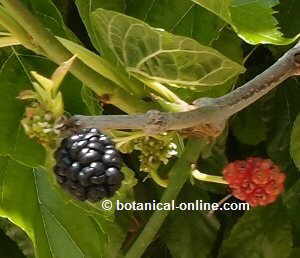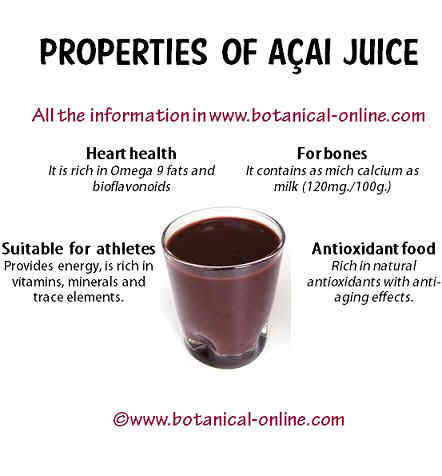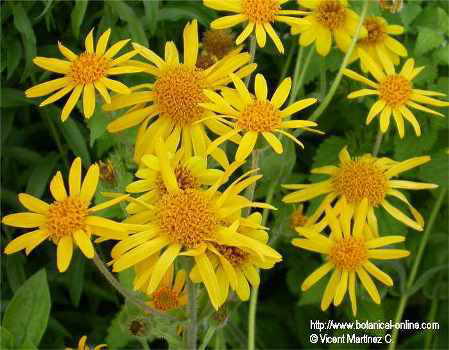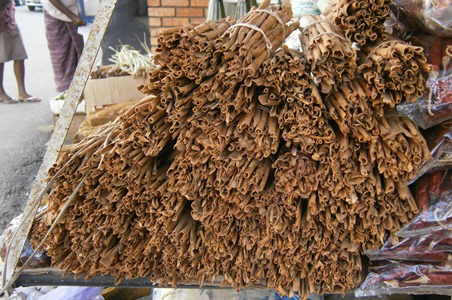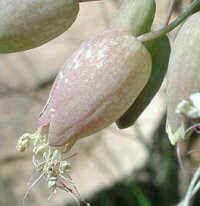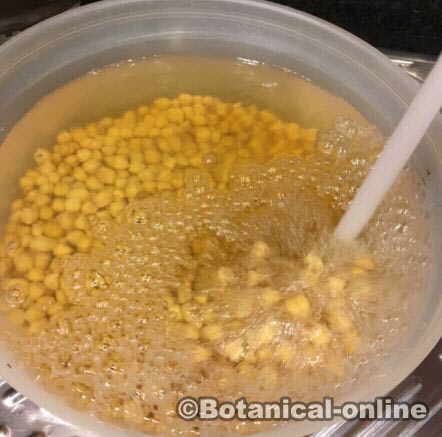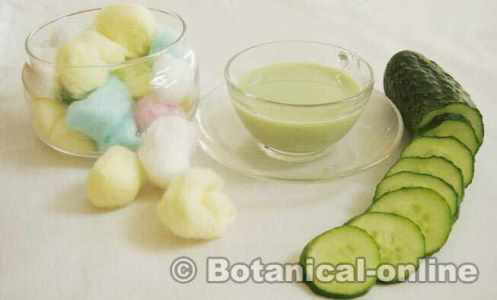Contents
- 1 When not taking anticoagulants
- 1.1 RISKS OF ANTICOAGULANTS
- 1.2 What are natural blood thinners?
- 1.3 What dangers using anticoagulants remedies has?
- 1.4 Who can not use anticoagulants?
- 1.5 Contraindications of anticoagulants
- 1.6 What precautions should people have when taking blood-thinning medications?
- 1.7 Avoid anticoagulant foods that thin the blood
- 2 Food and plants that enhance the effect of anticoagulants
When not taking anticoagulants
RISKS OF ANTICOAGULANTS
What are natural blood thinners?
Anticoagulant plants are those that decrease the clotting ability of the blood. This effect occurs because they have substances that block the coagulant effect of vitamin K.
In natural medicine these plants are used to treat poor circulation, after heart attacks, angina pectoris, arteriosclerosis, etc.
What dangers using anticoagulants remedies has?
Anticoagulants have significant health hazards. Any mismatch in the dose of anticoagulants can cause a lack of clotting and therefore heavy bleeding that can be fatal.
For this reason, you should always consult with a physician in the following cases
Who can not use anticoagulants?
The use of anticoagulants plants can be counterproductive in people who are prone to diseases caused by a lack of clotting as nosebleeds or bruising.
In addition there are a number of diseases and damages where the use of anticoagulant plants and remedies is contraindicated:
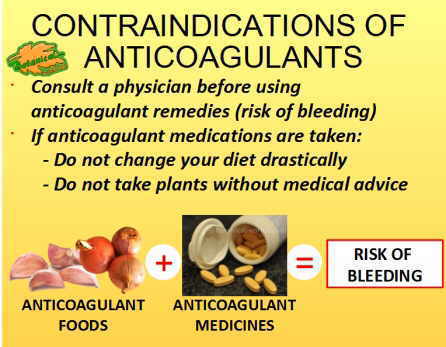 Summary of the main contraindications of plants, food and blood-thinning medications. They should not be combined with each other or with drugs that have the same effect because there is a risk of bleeding.
Summary of the main contraindications of plants, food and blood-thinning medications. They should not be combined with each other or with drugs that have the same effect because there is a risk of bleeding.
Contraindications of anticoagulants
No treatments with anticoagulant plants should be made in the following cases:
- Pregnancy and lactation
- Problems of coagulation such as hemophilia, thrombocytopenia or lack of platelets.
- People with regular nosebleeds and bruising
- Before or after surgery
- People taking blood-thinning medications should be especially careful when eating food or plants that can enhance this effect because of the high risk of bleeding that exists in these cases. Anticoagulant drugs are mainly: warfarin, acenocoumarol (Sintrom) and heparin.
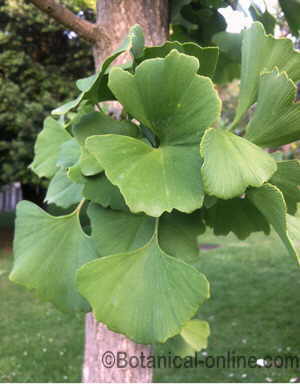 Ginkgo photo, plant with remarkable anticoagulant properties
Ginkgo photo, plant with remarkable anticoagulant properties
What precautions should people have when taking blood-thinning medications?
There are a number of interesting recommendations for people taking blood-thinning medications
People taking blood-thinning medications may need to know the following recommendations. These are interesting to avoid potential interactions between drugs and dietary or herbal medicine:
- Avoid low-fat diets, which potentiate the effect of anticoagulant drugs, increase the risk of bleeding. A normal fat diet, preferably virgin olive oil and good fats like avocado or nuts is recommended, for example eating seven walnuts daily.
Fried foods or foods with bad fats are not recommended.
- Avoid foods high in vitamin K: Vitamin K produces blood clot. Eating plenty of foods rich in this vitamin have opposite effect to medication and could produce clots.
Avoid anticoagulant foods that thin the blood
A diet too rich in foods that thin the blood could enhance the effect of anticoagulant medicines and plants. People taking anticoagulant drugs should avoid taking them excessively.
Anticoagulant foods they are mainly: onions, leeks and raw garlic. If you consume them, it should be in small quantities and not regularly, better cooked than raw (By cooking them, allicin is destroyed and its anticoagulant properties diminished).
We have also described other anticoagulant fibrinolytic foods, such as papaya, pineapple kiwi, ginger, licorice or melon. These foods should be eaten in moderation.
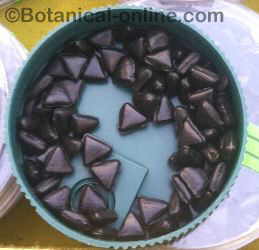 Photo of licorice. Those who take anticoagulant drugs should not eat licorice
Photo of licorice. Those who take anticoagulant drugs should not eat licorice
Food and plants that enhance the effect of anticoagulants
Phytotherapy and anticoagulant drugs
Natural anticoagulants may react with other remedies and anticoagulant drugs enhancing their action and increasing the risk of bleeding.
For example, people who take supplements of natural medicine as ginkgo should talk to their doctor before starting treatment with medicines containing anticoagulants, such as heparin, Sintrom or warfarin, or other drugs that cause blood to be more fluid as aspirin.
In addition we should mention two important contraindicated plants that dangerously enhance the effect of drugs and natural anticoagulants:
- Grapefruit (Citrus paradisii): It mainly has anticoagulant effect because it contains coumarin, with anticoagulant effects. In addition, grapefruit inhibits the drugs to be degraded having much more effect thab expected (blocking the cytochrome P450, which degrades most drugs).
Therefore, ‘Attention !!! Grapefruit enhances dangerously the effect of drugs. Do not take grapefruit if you take any type of medication due to this interaction. (Consult your doctor)
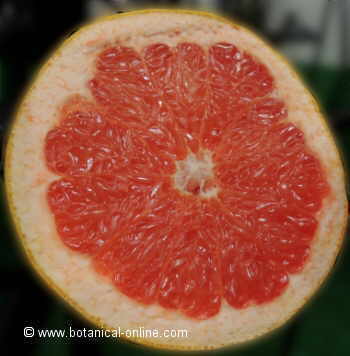 Photo of grapefruit
Photo of grapefruit
- St. John’s wort (Hypericum perforatum): It is contraindicated because it makes the drugs to be destroyed before preventing their effect what can produce clots. Hypericum can not combine with any medication because it eliminates its effect.
Do not combine different anticoagulants
When anticoagulant remedies are combined (drugs, plants and / or food) there is a high risk of bleeding. This means that you should not combine these plants with other remedies for circulation or blood-thinning medications.
Food modifes the effect of anticoagulants
Some plants with anticoagulant properties have other properties that make them equally suitable to avoid bleeding, because they possess bioflavonoids that increase the elasticity of capillaries and prevents bleeding. Such is the case of citrus fruits, like lemons, oranges, mandarins, etc.
This antagonistic effect with the food components indicates that food can modify or enhance the effect of and anticoagulant plants or drugs. Therefore, it is important not to drastically change the diet if these remedies are taken. Fasting, detox diets or diet based or fruit juices are discouraged.
Due to the complexity and danger of these remedies, it is recommended that people who take them always consult a doctor, especially if medication is invlolved.
*Related information:
– Plants and food to coagulate
![]() More information on anticoagulant and coagulant plants.
More information on anticoagulant and coagulant plants.

